Spain is taking a key step towards the data economy with the launch of the Data Spaces Kit, an aid programme that will subsidise the integration of public and private entities in sectoral data spaces.
Data spaces are secure ecosystems in which organizations, both public and private, share information in an interoperable way, under common rules and with privacy guarantees. These allow new products to be developed, decision-making to be improved and operational efficiency to be increased, in sectors such as health, mobility or agri-food, among others.
Today, the Ministry for Digital Transformation and Public Function, through the Secretary of State for Digitalisation and Artificial Intelligence, has published in the Official State Gazette the rules governing the granting of aid to entities interested in effectively joining a data space.
This programme, which is called the "Data Spaces Kit", will be managed by Red.es and will subsidise the costs incurred by the beneficiary entities to achieve their incorporation into an eligible data space, i.e. one that meets the requirements set out in the bases, from the day of their publication.
Recipients and Funding
This aid plan is aimed at both public and private entities, as well as Public Administrations. Among the beneficiaries of these grants are the participants, which are those entities that seek to integrate into these ecosystems to share and take advantage of data and services.
For the execution of this plan, the Government has launched aid of up to 60 million euros that will be distributed, depending on the type of entity or the level of integration as follows:
- Private and public entities with economic activity will have an aid of up to €15,000 under the effective incorporation regime or up to €30,000 if they join as a supplier.
- On the other hand, Public Administrations will have funding of up to €25,000 if they are effectively incorporated, or up to €50,000 if they do so as a supplier.
The incorporation of companies from different sectors in the data spaces will generate benefits both at the business level and for the national economy, such as increasing the innovation capacity of the beneficiary companies, the creation of new products and services based on data analysis and the improvement of operational efficiency and decision-making.
The call is expected to be published during the fourth quarter of 2025. The subsidies will be applied for on a non-competitive basis, on a first-come, first-served basis and until the available funds are exhausted.
The publication of these regulatory bases in the Official State Gazette (BOE) aims to boost the data ecosystem in Spain, strengthen the competitiveness of the economy at the global level and consolidate the financial sustainability of innovative business models.
More information:
Regulatory bases in the BOE.
Data Space Reference Center LinkedIn page.
The Sistema Nacional de Publicidad de Subvenciones y Ayudas Públicas (SNPSAP) is a tool that contributes to the transparency, dissemination and re-use of data related to public subsidies and grants. This system centralises all the information on calls for applications and concessions of subsidies and public aid approved by the General State Administration, the autonomous communities and local entities.
Origins of the project
We have to go back to 2014 to find the beginning of this project. That year saw a reform of the 2003 General Law on Subsidies (Law 38/2003) with a huge impact in two significant respects:
-
On the one hand, the National Subsidies Database, which had been created by the aforementioned Law in 2003, became available for full consultation by the managing bodies of subsidies and grants of all public administrations and those others legally authorised.
- Moreover, the National System of Publicity of Public Subsidies and Grants was created as a public website, with free and unrestricted access for all citizens. This complied with the requirements of publicity and transparency of all public subsidies and aid granted in Spain, especially calls for applications and awards, with identification of the beneficiaries. This space began operating on 1 January 2015, offering data from the state administration. The following year it was extended to regional and local administrations, thus covering the entire spectrum of the public sector.
Initial data formats and functionalities
From its origin, there was a serious support for the re-use of data for the society that originates it. Already initially the website allowed downloading of data in different formats (CSV, XLSX and PDF) that allow their reuse, although limiting the size of the downloads to 10,000 records for performance and technical capacity reasons.
In addition, a alert subscription mechanismwas available from the outset. A citizen or company could - and can - register as many alerts as they need so that the system automatically notifies them when any call of interest to them is published, sending them a link to it. The tedious need to consult the dozens of official newspapers published in Spain on a daily basis to find out about calls for grants and subsidies was thus eliminated at a stroke.
A project in constant evolution to cope with growth
Regulatory developments in the field of aid and subsidies in the European Union, and Spain's accession to the United Nations Open Government Partnership initiative, shaped the growth of the website in successive years, increasing the offer of specific data views (State aid and minimis, large beneficiaries, political parties, etc.), which made it easier for citizens and data reusers to access them.
At the dawn of the pandemic, the system was already supporting 1.3 million visits per year, serving 3.3 million pages of grants and calls for proposals. This posed a challenge in terms of performance, as volumes never foreseen in the initial technical designs were achieved. A deep technological reform was needed to support the high demand for information and service level.
The reform was approached not only from a technological point of view, but also taking into account:
- The new features established in the Royal Decree 130/2019 regulating the National Grants Database.
- The socially demanded need to enable a API-REST interface for downloading information in reusable JSON format to overcome technical limitations.
Characteristics of the current platform
The new website was put into production at the end of November 2023, offering multiple views of calls for proposals (520,000 as of December 2024), grants (27,700,000), State aid awards (5.000,000), grants of minimis (3,190,000), strategic grant plans (1,341), very serious infringements (4), grants to parties (7,580), and grants to large beneficiaries (145,000).
All this information is accessible today via screen, downloadable in PDF, CSV, XSLX and API-REST interface formats in JSON and XML, being freely reusable by infomediary companies and citizens, with no restrictions other than those established by law.
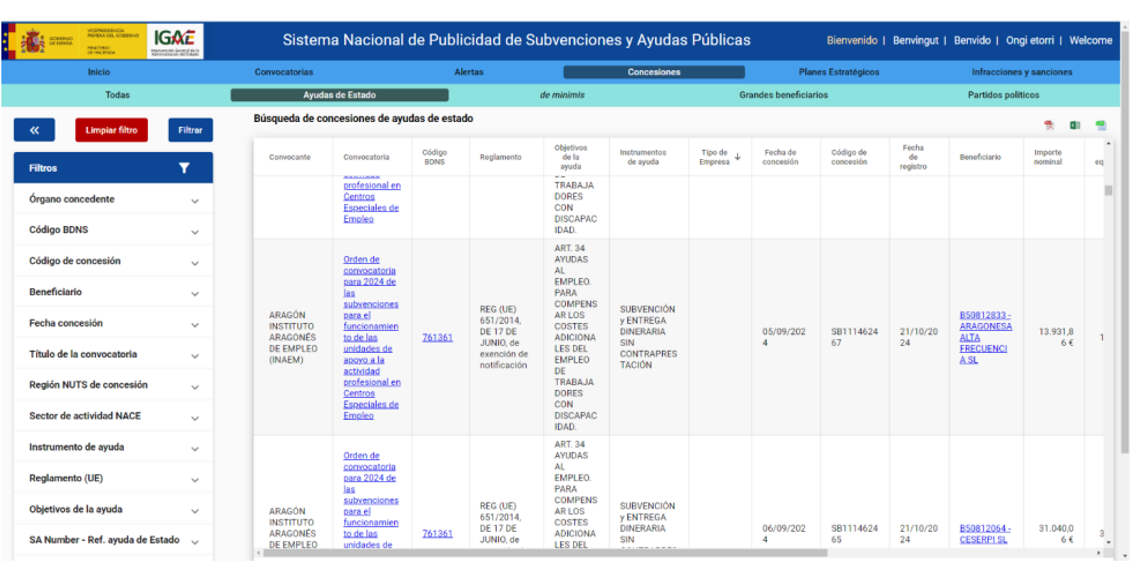
Figure 1. Capture of the website of the National System for the Publicity of Public Subsidies and Grants (SNPSAP).
Since it went into production 11 months ago, the new system has received 7.5 million visits from citizens and businesses. And through the API-REST interface, thousands of downloads are made daily, making a powerful contribution to the dissemination of "raw" subsidy information for reuse by society for all kinds of analyses, studies, etc. In addition, an average of 35,000 e-mail alerts are issued daily to citizens and companies to inform them of new calls for subsidies.
Advantages of SNPSAP
The social dissemination and reuse of all this information eliminates asymmetries and frictions in the markets, and allows operators and citizens to work more efficiently and productively, resulting in higher levels of welfare for society.
The publication of open data allows citizens and organisations not only to know how public funds are distributed, but also to identify new opportunities. This system ensures that all individuals and organisations have equal access to information, regardless of their size or resources, contributing to a more equitable distribution of public support.
The Ministry for the Digital Transformation and Civil Service, on 17 December, announced the publication of the call for proposals for products and services for data spaces, an initiative that seeks to promote innovation and development in various sectors through financial aid. These grants are designed to support companies and organisations in the implementation of advanced technological solutions, thus promoting competitiveness and digital transformation in Spain.
In addition, on 30 December, the Ministry also launched the second call for proposals for demonstrators and use cases. This call aims to encourage the creation and development of sectoral data spaces, promoting collaboration and the exchange of information between the different actors in the sector.
The Ministry has been conducting promotions through online workshops to inform and prepare stakeholders about the opportunities and benefits of the data space sector. It is expected that these events will continue throughout January, providing further opportunities for stakeholders to inform themselves and participate.
The following material is of interest to you:
Call for demonstrators and use cases
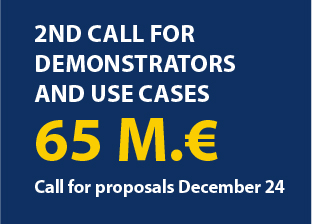

- Data space demonstrators and use cases (2nd call for proposals).
- Enquiry mailbox: dcu2.espaciosdedatos@digital.gob.es
- Presentations and helpful videos:
Products and services
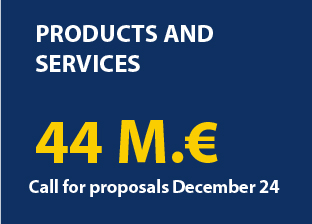

- Call for proposals for products and services for data spaces.
- Consultation mailbox: ps.espaciosdedatos@digital.gob.es
- Presentations and helpful videos:
TheMinistry for the Digital Transformation and Civil Service has presented an ambitious Plan for the Promotion of Sectorial Data Spaces. Its objective is to foster innovation and improve competitiveness and added-value in all economic sectors, promoting the deployment of data spaces where data can be securely shared. Thanks to them, companies, and the economy in general, will be able to benefit from the full potential of a European data single market.
The Plan has a 500 million euros budget from the Recovery, Transformation and Resilience Plan, and will be developed in 6 axes and 11 initiatives with a planned duration until 2026.
Data spaces
Data sharing in data spaces offers enormous benefits to all the participating companies, both individually and collectively. These benefits include improved efficiency, cost reduction, increased competitiveness, innovation in business models and better adaptation to regulations. These benefits cannot be achieved by companies in isolation but requires the sharing of data among all the actors involved.
Some examples of these benefits would be:
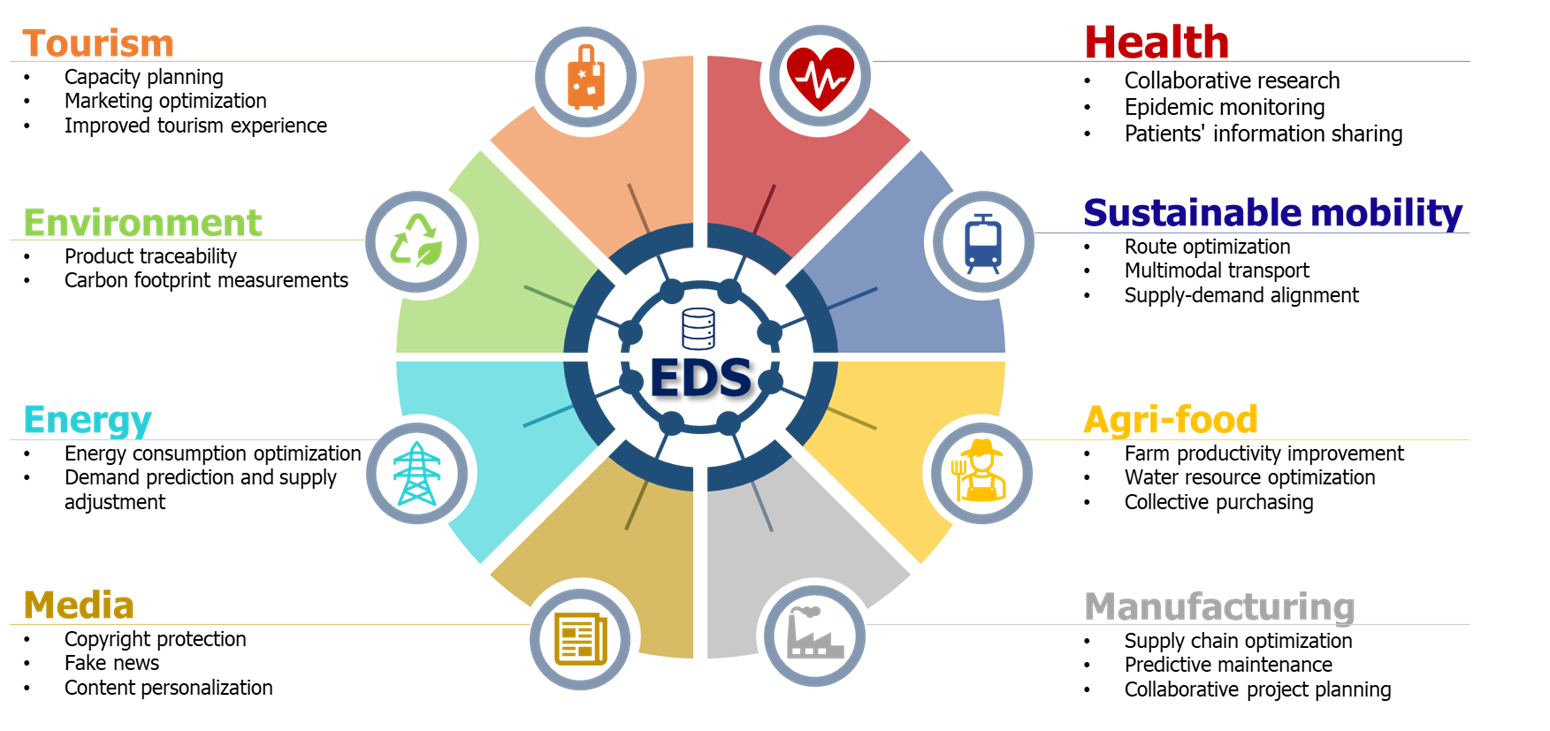
Figure 1. Impact of data spaces on various sectors.
Some specific initiatives include:
- The AgriDataSpace project ensures food quality and safety through full traceability of products.
- The Mobility Data Space project improves urban planning and transportation efficiency by integrating mobility data.
Benefits of the Plan for the Promotion of Sectorial Data Spaces
The Plan will offer more than €287 million in grants for the creation and maintenance of data spaces, the development of high-value use cases and the reduction of costs for participating companies when consuming, sharing or providing data. It will also offer up to 44 million euros in grants to the technology industry to facilitate the adaptation of their digital products and services to the needs of data spaces and the entities that participate in them by sharing data and making our industry more competitive in data technologies.
Finally, with a budget of up to 169 million euros, several unique projects of public interest will be developed that will act as enablers for digital transformation focused on data and data spaces in all economic sectors. These enablers will contribute to accelerate the process of deploying use cases and data spaces, as well as stimulate companies to actively share data and obtain the expected benefits. To this end, a network of common infrastructures and data space demonstrators will be developed, a National Reference Center for data spaces will be set up, and the entire non-open public data sets held by public administrations which are of high interest to businesses will be made available to the economic sectors.
Learn more about the Plan and its measures
The set of initiatives to be developed by the Plan is summarized in the following table:

Figure 2. Summary table with the initiatives included in the Plan for the Promotion of Sectorial Data Spaces.
Discover the grants that are currently active, and the planned schedule to benefit from them:


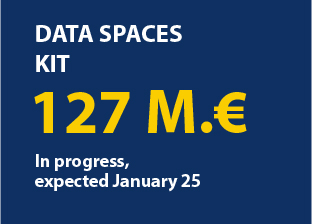
More information about data spaces here.
Links of interest

The European Union wants to bring digital technology closer to businesses, citizens and public administrations. To this end, it launched the Digital Europe Programme, which aims to close the gap between research in digital technology and its implementation in all sectors of the economy and society. With a 6-year extension (2021-2027), the programme covers areas such as supercomputing, artificial intelligence, cybersecurity and advanced digital skills.
Given that open data has a key potential in the development of many of these disruptive technologies, it is not surprising that within the programme we also find specific grants aimed at their development. This is the case of the "Public Sector Open Data for AI and Open Data Platform" grants, included in the programme's Cloud Data and TEF call (DIGITAL-2022-CLOUD-AI-02).
The objective of these grants is to boost the availability, quality and usability of high-value public sector data, in compliance with the requirements of the Open Data Directive and the re-use of public sector information. This, in turn, is intended to boost the re-use and combination of open public data across the EU for the development of information products and services, with a special focus on Artificial Intelligence.

The importance of high-value data
According to Directive (EU) 2019/1024, high-value data is a set of datasets with a high potential to generate "benefits for society, the environment and the economy, in particular because of their suitability for the creation of value-added services, applications and new, decent and quality jobs".
Initially, the Directive listed 6 categories of data to be considered of high value: geospatial, earth observation and environmental, meteorological, statistical, company and mobility data. However, these categories will be modified in the future to respond to technological and market changes. In Spain, the role of adding new categories of high-value data falls to the Data Office with the collaboration of public and private stakeholders, as specified in Royal Decree-Law 24/2021, of 2 November, transposing several European Union directives, including Directive 2019/1024.
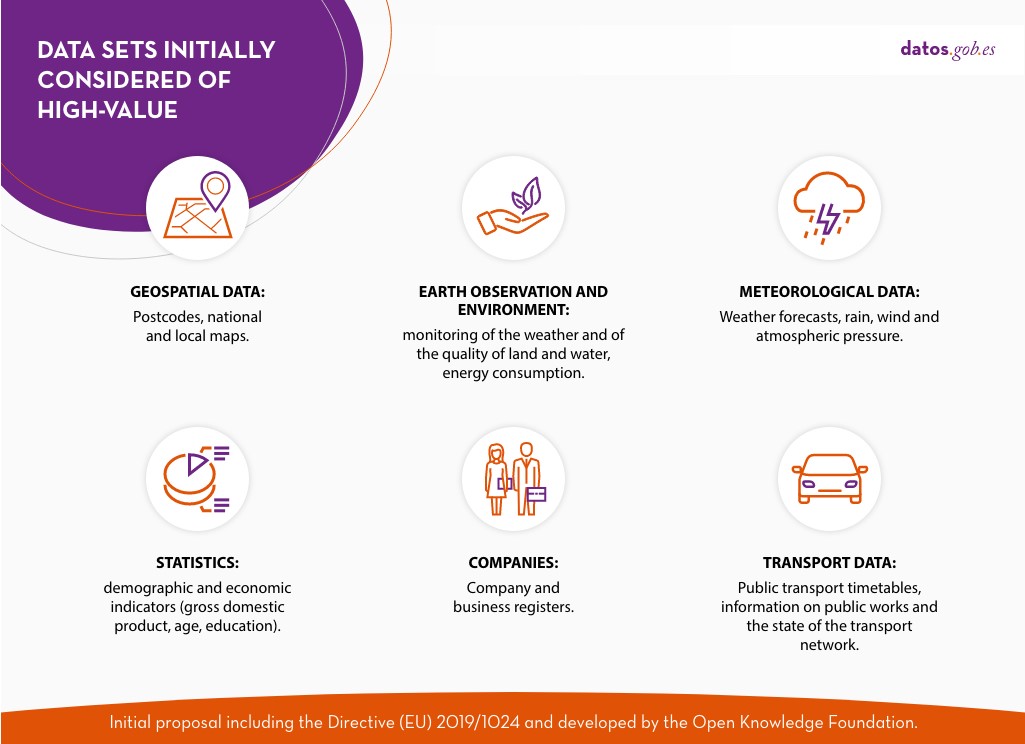
What is being sought?
The grants aim to support public administrations at local, regional and national level to increase semantic, technical and legal interoperability and portability of high-value data.
The datasets generated as a result of the work must meet the following conditions:
- They must be freely available through one or more open data portals of the Member States.
- They must belong to one of the 6 thematic categories indicated in Directive (EU) 2019/1024.
- Both new datasets and datasets resulting from the merging of existing, harmonised, quality-enhanced, etc. datasets are valid.
- They must be available through application programming interfaces (APIs), in a machine-readable format.
- Their publication and re-use conditions must be compatible with an open standard licence.
- They must have quality standards (attribute lists, formats, structures, semantics, documentation and terms of use) that ensure cross-border interoperability.
The proposal should propose concrete Key Performance Indicators (KPIs) to assess the benefits of the implemented solutions for citizens and/or businesses.
What does the aid cover?
The aid covers 50% of the actual costs in a number of "eligible" categories, including staff costs, communication costs, purchasing costs, etc.
To whom is the proposal addressed?
The grants are targeted at public administrations to which the obligations of Directive 2019/1024 apply. Public and private data re-users may be involved in the choice of the datasets to be prioritised.
Only legal entities, not natural persons, from EU Member States associated to the European Economic Area or the Digital Europe Programme can participate.
How to participate?
Proposals must be submitted electronically through the European Commission's Funding and Tendering Portal, using a number of forms provided in the system:
- Application Form Part A. Contains administrative information and the summary budget for the project.
- Application form Part B. Contains the technical description of the project (Max. 70 pages).
- Mandatory annexes and supporting documents
The deadline for applications is 17 May 2022.
Earth Observation data have great potential to create new innovative products and services, an issue that the European Union wants to promote. Therefore, within the Horizon 2020 program, the Parsec accelerator has been launched. Parsec will allocate 2.5 million euros to transform ideas into solutions that take advantage of the potential of this type of data.
The project is developed in connection with the Copernicus program and in collaboration with the European Space Agency and 9 entities from 7 countries, such as Avaesen (Valencian Association of Energy Sector Companies).
The project began in May and will last for 30 months. SMEs, start-ups, entrepreneurs and researchers from member countries of the European Union and associated countries can participate. They only need one idea related to some of the following areas:
• Food: smart agriculture, food security, distribution, etc.
• Energy: renewable energy, Smart Cities, infrastructure monitoring, gas, oil, etc.
• Environment: water and air quality, climate change, forestry, marine resources, etc.
Those interested in participating must submit their idea before December 20, 2019 through the following form. To do this, they must prepare a video of no more than 3 minutes in which they talk about their skills and their vision of innovation.
From then on the project will be developed in two phases:
- Phase 1: After a period of self-evaluation (the applicants themselves are those who evaluate the other applicants through a peer-to-peer application) 100 projects will be chosen, which will receive 10,000 euros each. In addition, the finalists can benefit from a support program that includes personalized training with European experts, coaching, networking with potential clients and partners, and tools to boost the business.
- Phase 2: In the second phase, 15 projects will be selected, which will receive 100,000 euros of funding each. In addition, those selected will have access to tools for testing developed products and the possibility of contacting specialized investors.
These phases will be developed according to the following calendar:
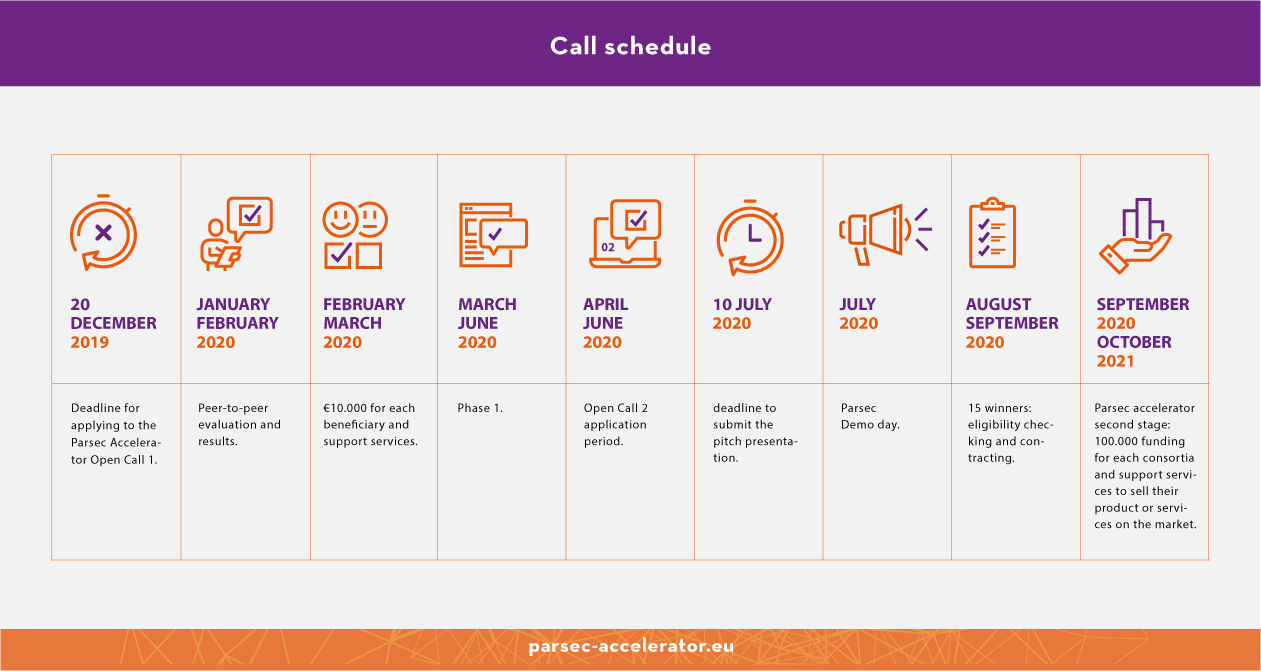
In addition to supporting SMEs and startups that use satellite data for business innovation, this project also seeks to create a community that remain once the call is finished, and that helps promote the international competitiveness of European remote sensing companies through the collaboration between groups. Therefore, many of the tools created will remain active once it is finished.
If you wish to participate, you can find the complete information in the Guide for applicants.
The Connecting Europe Facility (CEF) Telecom branch finances the deployment of pan-European telecommunications infrastructure for the interconnection of Member States. To this end, each year the European Union allocates funding for both digital service platforms and general services that integrate these platforms with national structures. One of the areas included in the initiative is open data.
In this context, the call for general services in the area of open data was published on July 4. Specifically, 5 million euros are allocated to boost the development of information products and services based on the reuse and combination of public and commercial data across the EU.
The suggested products and services must reuse data sets available through the European Data Portal, and combine them with other sources of information. In addition, these proposals are intended to be relevant for more than one Member State in terms of geographic data coverage and / or utility.
The EU encourages proposals that address categories or areas of geographic coverage that need additional improvements in terms of content, interoperability and data quality, as well as proposals that would lead to the improvement of existing data platforms. Specifically, the proposals submitted must address all the challenges listed below:
- Support the deployment of new innovative services by integrating/developing ecosystems supported by open platforms.
- Harmonisation in terms of data content, paying special attention to the level of detail (granularity), data structure and semantics.
- Address both technical and legal issues, including the adoption of harmonised conditions for re-use.
- Address priority domains as defined in European Commission notice 2014/C 240/01"Guidelines on recommended standard licences, datasets and charging for the reuse of documents" and in annex I to Directive (EU) 2019/1024 on open data and the re-use of public sector information. These categories are: the domains of geospatial, earth observation and environment, meteorological, statistics, mobility and companies’ data (for example, business records). Other categories can be considered, when duly justified.
- Facilitate the re-use of data, making use, as much as possible, existing or newly developed APIs.
- Provide mechanisms for assessing the impact of solutions, through concrete Key Performance Indicators (KPIs), and collect examples of re-use.
- Datasets generated by the Actions will have to be discoverable and available through one or more Member State open data portals and through the European Data Portal.
The deadline for submitting the proposals ends on November 14, 2019. Then, an evaluation period will begin, culminating in the resolution in April-May 2020 (estimated date).
You can read the full call here, and get inspired by last year's winners.




